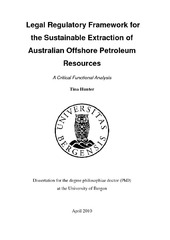| dc.description.abstract | The sustainable development of petroleum resources in Australia forms the study of this thesis. Sustainable development in this thesis is defined as development that meets the needs of the present without compromising the ability of the future generations to meet their own needs. It encompasses three interconnected pillars: economic development, social development and environmental protection. This thesis is confined to an analysis of the sustainable socio-economic extraction of Australia’s offshore petroleum resources. In extracting petroleum resources, there is a necessity for the State and private oil companies to enter into a long-term relationship to be able to exploit these resources. This brings many challenges: political, regulatory, economic, commercial and technological. These challenges are discussed, particularly in light of the tension that occurs between the commercial imperatives of private oil companies to generate profit, and the socio-economic imperatives of the Sate to ensure sustainability for future generations. This thesis considers these challenges in Australia, analysing whether petroleum resources have been sustainably developed. Where it has identified that sustainable development has not yet been attained, it analyses other jurisdictions to determine whether lessons can be learned from these jurisdictions. In particular, this thesis focuses on how Norway has been able to utilise the legal regulatory framework to encourage sustainable socio-economic development of petroleum resources for the benefit of all of Norwegian society. Firstly, this thesis considers Australian offshore petroleum policies, identifying that although the focus of Australia’s petroleum policies for the last decade has been towards encouraging international investment, it recently has been expanded to encompass a policy of sustainable development. However, an analysis of Australia’s policy finds that it fails to encourage the maximisation of the value of Australian petroleum for the benefit of the Australians. The commercial focus of Australia’s petroleum policy prevails, mandating commercial investment and strong industry control. An analysis of Norwegian petroleum policy demonstrates a policy built on a platform of State direction and control over resources to ensure that present and future Norwegians benefit from the conversion of Norwegian petroleum wealth to societal wealth. The tenets of Norwegian petroleum policy provide a number of valuable lessons for Australia, demonstrating the need for stronger State control in the development of petroleum resources, and the need for policy to focus on the development of resources for current and future generations. An analysis of the Australian petroleum legislation suggests it is a prescriptive, rule-based legislative framework that creates unnecessary regulatory burden, and generates economic and social costs. In contrast, an analysis of legislative frameworks from other jurisdictions, namely Norway and South Australia (onshore petroleum legislation), indicates that a principle-based legislative framework with broad enabling legislation and complementary regulations reduces regulatory burden, thereby encouraging sustainable development. Furthermore, this type of legislation encourages the State and oil companies to develop petroleum resources to meet the interest of the State whilst still realising a profit for the oil companies. This analysis also identifies the need for a single regulatory authority and the use of model contracts as part of the legislative framework in order to encourage the sustainable socio-economic development of Australia’s petroleum resources. The allocation of a petroleum licence is important for the sustainable development of petroleum resources in Australia. It is crucial since it not only identifies the best partner for the State in exploiting petroleum resources to ensure maximum extraction, it also establishes the relationship between the State as owner of the resource and the oil companies that extract the resource. It is through the allocation of a licence that the State has the opportunity to ensure that the interests of the licencees and the State are aligned as closely as possible. An analysis of the methods of allocation of petroleum licences demonstrates that where a State seeks to gain economic return for its resource, then the use of the bid system is appropriate. However, where a State seeks to gain sustainable benefits, the bid system is inadequate. Furthermore, analysis of the Australian work program bidding system and the current good standing provisions identifies a system that undermines Australian petroleum policy objectives. The current process for the allocation of petroleum licences encourages neither certainty nor sustainable development. An analysis of the Norwegian and United Kingdom system of petroleum licence allocation demonstrates that the use of discretion in the allocation of petroleum licences is able to meet respective national policy objectives for each State. The sustainable development of petroleum resources relies on extracting as much petroleum as possible from a field. To determine whether sustainable extraction of petroleum is occurring in Australia, there is an analysis of whether State regulation of the rate and method of petroleum extraction is necessary in order to achieve sustainable development. An analysis of the Australian regulatory framework pertaining to field extraction and the current practices of oil companies in the extraction of petroleum suggests that optimal extraction is not occurring in many fields, and the present petroleum legislation provides little capacity for the State to regulate extraction. An analysis of Norwegian field extraction regulation, and the mandatory requirement for the development and use of technology to ensure the optimisation of extraction from field demonstrates that State regulation of petroleum extraction, particularly the method of extraction, has the capacity to encourage the sustainable extraction of petroleum. | en_US |
